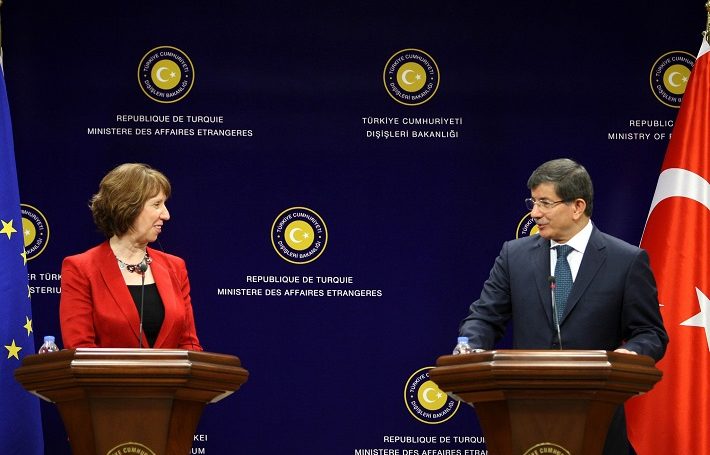
In January 2013, when David Cameron first proposed the referendum on Britain’s future in the European Union, in order to pacify Eurosceptics within his ruling Conservative party, he could scarcely have imagined that Turkey would play such a prominent role in the campaign.
The concerns of the British public over the possibility of “an invasion of Turkish migrants” were exploited by the ‘leave’ camp as a means to strengthen support for a withdrawal from the EU, amid heightened anxiety within Britain and in Europe as a whole over the migrant crisis. It was claimed that continued British membership of the EU would lead to a loss of control over the number of migrants entering the United Kingdom. The March 2016 agreement between the EU and Turkey on migration was held up as a perfect case in point. The Brexit campaigners pointed to a clause in the agreement referring to talks on new chapters in the possible Turkish accession process to the EU as evidence that Ankara would eventually join the EU, even though most experts argue that this is highly unlikely.
The ‘leave’ campaign also claimed that negotiations between the EU and Turkey over visa exemptions for Turkish citizens would pose a grave security threat, with Britain exposed to a wave of terrorists travelling from Syria and Iraq, in spite of the fact that no more than 14 per cent of Turkish citizens hold a passport.
The UK Independence Party (UKIP) ran a notorious advertisement during the campaign showing a queue of migrants with the caption ‘Breaking Point’. The advertisement suggested that Britain would be overrun by refugees if it did not leave the EU. The Brexit campaign also claimed that continued EU membership would lead to rising threats to British security as a result of the entry of Turkish criminals and terrorists into the country. While Boris Johnson and Michael Gove, the campaign leaders, distanced themselves from the UKIP advertisement, their constraint refrain emphasized the need for Britain to “take control” over immigration flows.
Britain’s Prime Minister David Cameron remarked that the Brexit claims over Turkish membership of the EU were patently false. He and other leading figures in the ‘Remain’ camp pointed out that Britain and other EU countries would be able to veto any new members of the EU, and that Turkey would be unlikely to join the EU “until the year 3000.” However, the Brexiteers retorted that Cameron was hiding his true intentions, and was actually supporting Turkish membership of the EU while claiming at the same time that this would never happen.
Much of the success of the ‘leave’ campaign was based upon an emphasis on the dangers of Turkish immigration. Its case was certainly boosted by the growing authoritarianism of Turkish President Recep Tayyip Erdogan which has tarnished the image of his country in western eyes. Johnson himself capitalized on Erdogan’s unpopularity in May, winning a prize for penning the “most offensive Erdogan poem” (even though the ex London mayor has Turkish roots, and has expressed support in the past for its membership of the EU). Erdogan, for his part, has wasted little time in gloating over Cameron’s fate and that of the EU in the wake of the Brexit vote.
While it is difficult to quantify the exact impact of the Turkey question on the final referendum result, there is little doubt that public fears over immigration played a crucial role and that anxiety over Turkey was at the heart of these concerns. Yet, Brexit has also forced the Turks into soul searching over their own future relationship with the EU. Erdogan has raised the possibility of holding a referendum in Turkey over whether to continue the accession talks with the EU.
It is conceivable that the Brexit will enable both Ankara and the EU to climb down from their high horses and find a dignified face-saving solution over the negotiations which have made little progress. Germany’s president Angela Merkel and the then French President Nicholas Sarkozy offered Turkey a ‘privileged partnership’ in 2009, but Ankara rejected it out of hand.
Henry Kissinger argued in the Wall Street Journal (28 June) that “the EU should not treat Britain as an escapee from prison but as a potential compatriot.” In the event that Britain and the EU can reach an amicable divorce (a big ‘if’) which can result eventually in a privileged partnership for Britain, Turkey may well change its tune.
Further Reading on E-International Relations
- Will Brexit Happen?
- The Days of May (Again): What Happens to Brexit Now?
- Brexit and the Consequences for International Peacebuilding
- Grexit and Brexit: Lessons for the European Union
- Post-Brexit EU Defence Policy: Is Germany Leading towards a European Army?
- In Varietate Concordia: How Path Dependency Affects the Brexit Negotiations